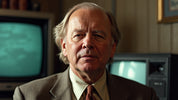
Discover the Untold Story of Ronald Wayne: The Forgotten Third Co-Founder of Apple
, by Unboxify, 4 min reading time

, by Unboxify, 4 min reading time
The tale of Apple's humble beginnings is one that most technology enthusiasts would be familiar with. It’s a classic story of friendship, innovation, and turning dreams into reality. In April 1976, 21-year-old Steve Jobs and 26-year-old Steve Wozniak began building their technological empire from the garage of Jobs's parents' home. Everyone knows Jobs and Wozniak, but did you know there was a third co-founder? His name was Ronald Gerald Wayne, and his story is a cautionary tale of missed opportunities.
Born in Cleveland, Ohio, Ronald Wayne had a relatively unremarkable childhood. But he was always a curious child, keen on understanding how things worked. In 1953, he graduated from the School of Industrial Arts in New York and then delved into self-education in electrical, mechanical engineering, and product development. At 22, he moved west seeking opportunity and worked various jobs throughout his 20s and early 30s.
In 1971, Wayne started his own engineering firm named Cyan, specializing in slot machines. Despite his engineering brilliance, his business acumen fell short. His venture failed, and he spent the following year repaying every investor, feeling personally responsible for their losses. The trauma from this experience shaped his future tendency to avoid risk, a key part of the Apple story later on.
Wayne landed a job as Chief Draftsman at the newly founded Atari video game company, where he met Steve Jobs and Steve Wozniak. Jobs approached Wayne with various business ideas, but Wayne was skeptical due to his past failures. Despite his reservations about Jobs, whom he found difficult to work with, he recognized Jobs's passion and drive. Eventually, after much debate and discussion, Wayne agreed to join Jobs and Wozniak in their new venture.
On April 1, 1976, the Apple Computer Company was born. Jobs and Wozniak each held a 45% stake, leaving Wayne with 10%, acting as a tiebreaker in decisions where the two Steves couldn't agree. Wayne drafted the partnership agreement, set roles for each founder, and designed Apple's first logo. With Steve Jobs handling electrical engineering and marketing, and Wozniak in charge of electrical engineering, the trio developed their first product—the Apple I.
Steve Jobs sold his VW Microbus and Wozniak sold his HP calculator to fund the creation of their first prototype. The Apple I was a computer kit that allowed hobbyists to tinker with the new world of personal computers. Wayne wrote the manual and designed the company's first logo. The prototype quickly gained traction, and 200 units were sold within ten months. Jobs even secured an order from The Byte Shop for 50 computers at $500 each.
Despite the early success, just 12 days after the company’s formation, Wayne resigned. He sold his share back to Jobs and Wozniak for $800. Apple was just one of many startups forming in basements and garages at the time, and Wayne was wary of the risks. His previous business failure haunted him, and he believed Apple was a gamble he couldn’t afford to take.
Following his departure from Apple, Wayne continued working in various roles in California, staying with Atari until 1978. He then worked for Lawrence Livermore National Laboratory and later joined LDF Semiconductors. Apple went public in 1980, but Wayne had already moved on. He pursued his passion for collecting stamps and coins, opening his own store. Although initially successful, the store eventually closed due to market collapse and break-ins.
In a cruel twist of fate, Wayne lost his life savings in a home robbery and had to sell his home to make up for the loss. He now lives in a mobile home park in Nevada, continuing his passion for collecting stamps and rare coins. Wayne published two books and is crowdfunding a third. Despite missing out on potentially billions, Wayne has no regrets about leaving Apple. He stands by the decision he made with the information he had at the time.
Wayne is often praised by Jobs and Wozniak for being kind, intelligent, and gracious. He doesn't regret his decision to leave Apple, even when he sold his original Apple contract for $500, only for it to be auctioned later for $1.59 million. Reflecting on his life, Wayne said, “In that, you have the story of my life.” He serves as a poignant reminder of how past failures can shape future decisions, and the importance of living with those choices.
Ronald Wayne’s story prompts us to ask ourselves: How would we have acted in his shoes? It’s easy to wonder what could have been, but Wayne has chosen to live without regrets, making peace with his decisions. His story is a fascinating facet of Apple’s history, one that underscores the unpredictable nature of entrepreneurship.
Would you have taken the risk or played it safe like Wayne?







